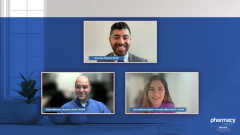
Bispecific Antibodies in DLBCL: Patient Response
Experts explore early outcomes and patient candidacy factors for bispecific antibody therapy in diffuse large B-cell lymphoma (DLBCL) and discuss responses, real-world evidence, trends in patient outcomes, and selection biases.
Episodes in this series

This is a video synopsis/summary of a Practice Pearls involving Zahra Mahmoudjafari, PharmD, MBA, BCOP, FHOPA; Robert Mancini, PharmD; and Amir Ali, PharmD, BCOP, FHOPA.
In this segment, Mahmoudjafari, Mancini, and Ali discuss trends and outcomes of patients treated with bispecific therapies. Ali acknowledges that data is still maturing, with these drugs approved in May 2023. Anecdotally, patients, even in advanced therapy lines, show strong responses, while some refractory to chimeric antigen receptor (CAR) T-cell therapy exhibit lower responses.
The conversation anticipates significant research in this space, suggesting the prominence of this topic in conferences such as the 2024 American Society of Hematology Annual Meeting & Exposition. Mancini emphasizes 2 primary patient-driven factors for assessing bispecific candidacy: clinical appropriateness and patient fitness. He notes potential selection bias, as the off-the-shelf availability of bispecifics influences patient choices between them and CAR T-cell therapy. Operational considerations, including caregiver support, become crucial due to unique adverse effects like cytokine release syndrome and neurotoxicity.
As they await more real-world evidence, their discussion highlights the need for research and patient-centric considerations in the evolving landscape of DLBCL treatments.
This summary was AI-generated and reviewed by Pharmacy Times® editorial staff.
Newsletter
Stay informed on drug updates, treatment guidelines, and pharmacy practice trends—subscribe to Pharmacy Times for weekly clinical insights.






















